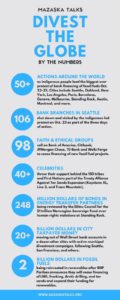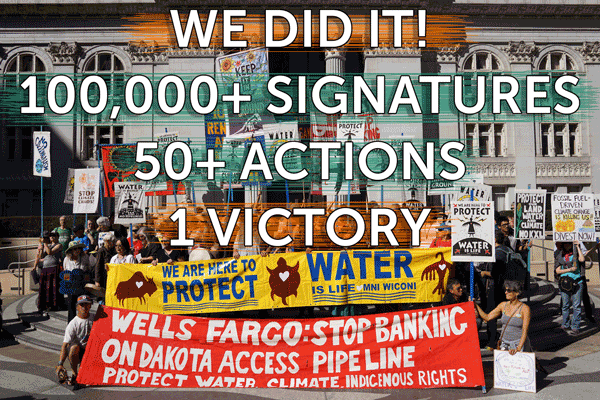First of all, thanks so much for taking action with us and our partners as part of the Equator Banks Act campaign. Over 110,000 people (including many of you) signed a petition calling on the biggest banks in the world to stop financing climate disasters and respect Indigenous rights. Even better, hundreds of you showed up at more than 50 #DivestTheGlobe actions in cities and towns around the world. Some of the highlights:
-

Click to see larger Seattle activists visited or shut down over 100 branches of the big banks in 3 days of action.
- Nearly 100 faith and ethics groups joined the call to action, demanding that Bank of America, TD Bank, JP Morgan Chase, Wells Fargo and other big banks stop funding fossil fuel projects.
- There were amazing, beautiful actions in cities all over the world including Columbia, South Carolina; Lausanne, Switzerland; New Haven, CT; Oakland, California; and many many more.
- Check out the feed below from Mazaska Talks which was made live on the first day of action.
Even, better (and worth waiting for) — I’ve got breaking news to share from the actual Equator Banks meeting itself in Brazil. Just to re-cap: 90 of the world’s largest banks met in Brazil October 23-26 to recommit to the Equator Principles, a set of rules guiding which big infrastructure projects they will and won’t finance. Our petitions and actions were intended to pressure these “Equator Banks” or EQIFs banks to rewrite and revisit their own (voluntary) commitment to those principles: Specifically the fact that Equator Banks had financed disasters for our climate AND indigenous rights like the Dakota Access Pipeline (DAPL) and Agua Zarca hydro project, where Indigenous leader Berta Cáceres was murdered for leading Indigenous resistance.
Well, just today we got word that it worked! The Equator Banks released a statement saying that they will “start a process of updating the Equator Principles” with a special focus on the “important implications of the Paris Agreement” and “application of Free, Prior and Informed Consent (FPIC) in different jurisdictions”.
Let’s be clear, this is EXACTLY what we asked for from these 90+ Equator Banks. And it is 100% a result of the pressure and publicity YOU helped put on them with your signatures, actions, events and more.

It’s also not, obviously, the end of the story. The Equator Banks process is planned to take more than 18 months, and hasn’t officially started yet. And we’ve already seen that even when banks promise to do the right thing, they often exempt current project, make caveats or otherwise backslide almost immediately.
Your continued diligence and follow up will be absolutely essential – and we promise to help by staying connected to Mazaska Talks and other indigenous, direct action, and pipeline fighting groups around the world. We’ll let you know the next time there’s an action, petition or event you can participate in on this campaign.
IN the meanwhile, what now? Well, if you like winning, and enjoyed this whole arc of emails from me and 198 methods (I’m the only person who works here) – then consider leaving us a tip. I love it when people chip in $1.98/week because it gives us the money to keep working week in and week out on projects like divest the globe, while paying a minimum (less than $1 a month) in credit card processing fees (for everything else, there’s Mastercard). I’d also point out that this action is exactly the sort of thing I started 198 methods to do: A big, digitally supported day(s) of action with over 100,000 people signed on, dozens of actions around the world, and a clear result (#winning) at the end.
I’m psyched, let’s do this again, soon.
Thanks,
Drew and the 198 ways to take direct action and divestment is one, crew.

It would be helpful if there was a link to put the result on facebook in order to show the power people have when they desire to see change and then take action to bring about that change.